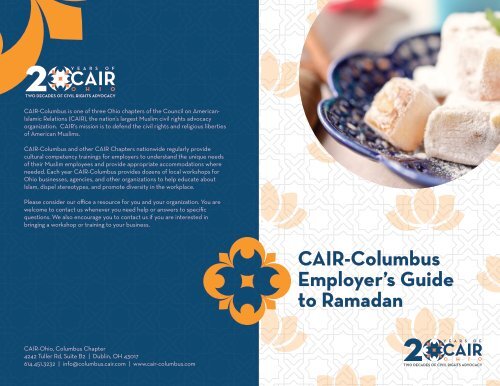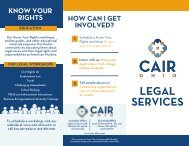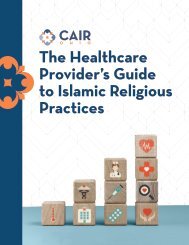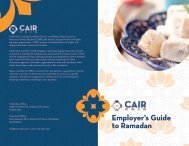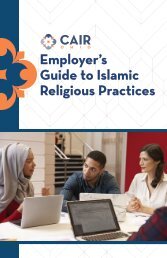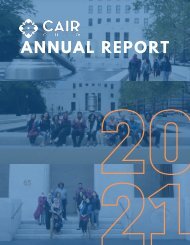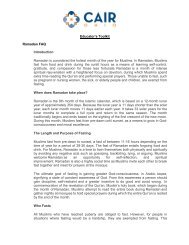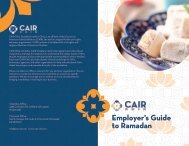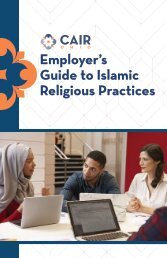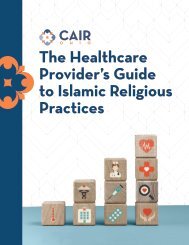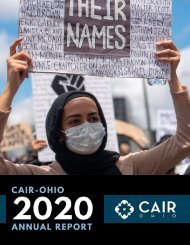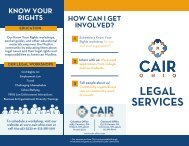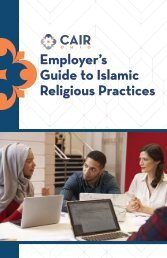CAIR-Columbus Employer's Guide to Ramadan
A brief guide for employers that explains the religious obligations that accompany the Islamic holy month of Ramadan along with suggestions for accommodations for employees during Ramadan and other Islamic holidays
A brief guide for employers that explains the religious obligations that accompany the Islamic holy month of Ramadan along with suggestions for accommodations for employees during Ramadan and other Islamic holidays
- No tags were found...
Create successful ePaper yourself
Turn your PDF publications into a flip-book with our unique Google optimized e-Paper software.
Y E A R S O F<br />
TWODECADESOFCIVILRIGHTSADVOCACY<br />
<strong>CAIR</strong>-<strong>Columbus</strong> is one of three Ohio chapters of the Council on American-<br />
Islamic Relations (<strong>CAIR</strong>), the nation’s largest Muslim civil rights advocacy<br />
organization. <strong>CAIR</strong>’s mission is <strong>to</strong> defend the civil rights and religious liberties<br />
of American Muslims.<br />
<strong>CAIR</strong>-<strong>Columbus</strong> and other <strong>CAIR</strong> Chapters nationwide regularly provide<br />
cultural competency trainings for employers <strong>to</strong> understand the unique needs<br />
of their Muslim employees and provide appropriate accommodations where<br />
needed. Each year <strong>CAIR</strong>-<strong>Columbus</strong> provides dozens of local workshops for<br />
Ohio businesses, agencies, and other organizations <strong>to</strong> help educate about<br />
Islam, dispel stereotypes, and promote diversity in the workplace.<br />
Please consider our office a resource for you and your organization. You are<br />
welcome <strong>to</strong> contact us whenever you need help or answers <strong>to</strong> specific<br />
questions. We also encourage you <strong>to</strong> contact us if you are interested in<br />
bringing a workshop or training <strong>to</strong> your business.<br />
<strong>CAIR</strong>-<strong>Columbus</strong><br />
Employer’s <strong>Guide</strong><br />
<strong>to</strong> <strong>Ramadan</strong><br />
Y E A R S O F<br />
<strong>CAIR</strong>-Ohio, <strong>Columbus</strong> Chapter<br />
4242 Tuller Rd, Suite B2 | Dublin, OH 43017<br />
614.451.3232 | info@columbus.cair.com | www.cair-columbus.com TWODECADESOFCIVILRIGHTSADVOCACY
The Muslim community will celebrate <strong>Ramadan</strong> and<br />
the two annual Islamic religious holidays, Eid al-Fitr<br />
& Eid al-Adha, on the following dates for 2017 & 2018:<br />
<strong>Ramadan</strong> Eid al-Fitr Eid al-Adha<br />
2017: 5/27 – 6/24 6/25 9/1<br />
2018: 5/16 – 6/14 6/15 8/22<br />
*Note: dates are approximate and may vary by one day depending on the individual’s<br />
religious school of thought.<br />
<strong>Ramadan</strong> is the month in which Muslims are required <strong>to</strong> fast from<br />
sunrise <strong>to</strong> sunset, and it can last from 29-30 days. It is a period of<br />
personal restraint and renewed focus on moral conduct. It is also a<br />
time <strong>to</strong> empathize with those who are less fortunate and <strong>to</strong> appreciate<br />
what one has. Fasting does not mean Muslims cease <strong>to</strong> work. An<br />
employee observing the fast will not be able <strong>to</strong> eat during typical<br />
lunch times. However, he or she will need <strong>to</strong> eat after sundown, or for<br />
those working night shifts, before dawn.<br />
Fasting during <strong>Ramadan</strong> is obliga<strong>to</strong>ry for Muslims. Muslims also<br />
increase their worship and study of the Qur’an during <strong>Ramadan</strong>, and<br />
often attend late night prayers that begin an hour and a half after<br />
sunset and last for two hours. These late nights cause many Muslims<br />
<strong>to</strong> rise later than usual, and some people may appear fatigued due <strong>to</strong><br />
hunger, thirst and disrupted sleep.<br />
Muslims celebrate two Islamic holidays each year called Eid al-Fitr and<br />
Eid al-Adha. Eid al-Fitr signifies the end of the month of <strong>Ramadan</strong>,<br />
and Eid al-Adha signifies the end of Hajj, Islam’s annual holy pilgrimage<br />
<strong>to</strong> Mecca. Both days are commemorated by Muslims worldwide<br />
through prayer, celebration, and gift giving according <strong>to</strong> their unique<br />
cultural traditions. Celebrating these holidays requires that Muslims<br />
take at least one day off twice every year. There should be no penalty<br />
for this religious obligation.<br />
We understand that Muslim employees need <strong>to</strong> maintain<br />
their required duties during this period of time. However,<br />
because federal and state law require employers <strong>to</strong> make<br />
reasonable accommodations for the religious practices of<br />
their employees, we urge you <strong>to</strong> take the following in<strong>to</strong><br />
consideration while scheduling for this upcoming year:<br />
1<br />
Employers can accommodate Eid Al-Fitr and Eid<br />
Al-Adha by not scheduling Muslim employees<br />
on this day. If certain hours of work need <strong>to</strong> be<br />
completed during Eid Al-Fitr or Eid Al-Adha, we<br />
ask that employers allow Muslim employees <strong>to</strong><br />
complete them before or after the employee’s<br />
excused holiday absence.<br />
2<br />
3<br />
4<br />
5<br />
Many Muslim employees are unaware that<br />
excused absences are allowed under federal<br />
law for religious holidays. We ask employers <strong>to</strong><br />
inform their Muslim employees of this option.<br />
Note that some Muslim employees might fast<br />
while others might not, depending on their<br />
faith-involvement.<br />
If an employer notices changes in an employee’s<br />
quality of work or behavior during <strong>Ramadan</strong>, we<br />
ask the employer <strong>to</strong> notify the employee(s) and<br />
discuss options with them.<br />
If concerned about the physical hardship of<br />
fasting, we ask you <strong>to</strong> contact the employee(s)<br />
and speak with them.


